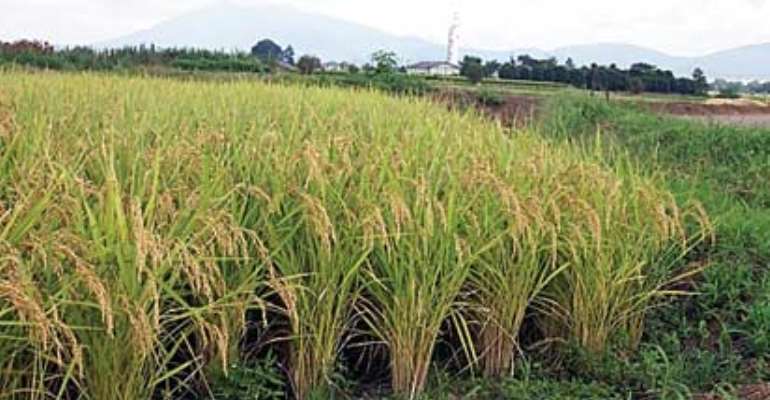NDDC's Giant Mill and the Rice Race

She looked at the monstrous machine with sadness written all over her face. She quickly snapped out of shock and put on her thinking cap. Before her was what one could rightly describe as a sleeping giant, a massive rice mill capable of producing 180 tonnes of rice daily, lying fallow at Elele Alimini in Rivers State.
For Dr. Christy Atako, the acting Managing Director of the Niger Delta Development Commission, NDDC, something must be done urgently. In very few words, she made it clear, there and then that the sleeping giant must be roused from its deep slumber.
The rice mill built by the NDDC had remained comatose since it was completed in 2010 for some inexplicable reasons. At a time when attention is focused on agriculture, the new NDDC boss could not accept allowing such a huge investment to continue to waste.
'We will do everything possible to ensure that farmers benefit from the rice mill so as to guarantee massive cultivation and production of rice in the Niger Delta. Farming used to be the major occupation of our people and here we are with a facility that can process about 3,600 bags of 50 kilogramme of rice. We are determined to re-activate the mill,' she said.
To match action with words, the acting MD promptly set in motion a process that would lead to the reactivation of the rice mill in the shortest possible time. She initiated a tripartite meeting between the NDDC, Rivers State government and the contracting firm that worked on the rice project.
At the meeting held on Tuesday, August 27, 2013, at the NDDC headquarters in Port Harcourt, Atako explained that it was important to forge a partnership which would ensure that the Elele rice mill was put into effective use as soon as possible.
Rice farm
She said: 'I feel very worried by what I saw when I inspected the mill. We have an urgent task to fix the problems so that our people can take advantage of the mill to boost rice production in our region. We used to rely on agriculture before oil took centre-stage. We have to return to what had sustained us in the past and President Goodluck Jonathan's transformation agenda places a lot of emphasis on agriculture.'
The NDDC boss noted that the body had earlier undertaken an exploratory trip to Spain to enlist the services of technical partners that would run the mill. 'We need to reap the benefits of that trip. We need to agree to work together to make the rice project successful,' Atako stated.
A representative of the Rivers government in, the partnership talks and the Permanent Secretary in the Ministry of Agriculture, Dr. Emmanuel Hart commended the efforts of the NDDC in the field of agriculture, noting that his ministry recently took delivery of 20 new tractors from the commission.
The Permanent Secretary said that the partnership had started before the current negotiations as the state government had made available 5,000 hectares of land at Emuohua Local Government Area for the cultivation of rice that would feed the Elele mill.
Briefing the meeting on what went wrong with the rice project, Chief Felix Idiga, the chief executive of Jafaac Investment, the company that installed the rice mill, lamented that the facility was not yet in use, three years after it was completed and test-run. He blamed bureaucracy as one of the factors responsible for the delay in commissioning the project.
'The plan then was to plant rice in the nine Niger Delta states to provide the stock for the mill. It is sad that this dream is yet to come to fruition. The Elele rice mill is one of the biggest in West Africa. When we did the test-run, we milled over 2,500 bags of rice,' he said.
It was a sad story all the way from the point of view of the contractor. But the NDDC was not prepared to continue crying over spilt milk. It was time to move on and find a solution to the problem. The NDDC's Director of Agric and Fisheries, Dr. Godspower Amadi, agreed that valuable time had been lost all the while that the mill remained idle but assured that things would change very soon. According to him,'we started commercial rice farming as far back as 2007 with nine pilot farms in the region.'
The contributions of the NDDC to the production of rice in the country is important to raise the level of production and return her to a position where she could once again supply raw materials to local industries and still have enough for export.
Trust the Minister of Agriculture and Rural Development, Dr Akinwumi Adesina, to drive the process. He certainly knows his onions and has been unrelenting in the quest to bring Nigeria back to the glorious days of food sufficiency through local production. Thus, it was a proud minister who stood before editors in Asaba, Delta State on August 23, to talk about food production in the country.
In a paper entitled: 'Agriculture: The Value Chain Roadmap,' which he delivered at the 9th All Nigerian Editors Conference with the theme: Nigeria Beyond Oil: Role of the Editor,' he said that the ministry had set 2015 as the target date for the country to become self-sufficient in rice production.
